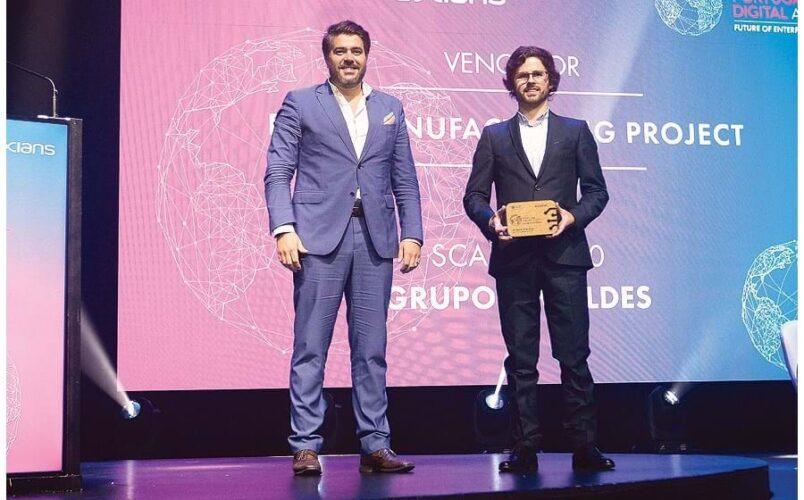Simoldes Group Wins Award at the Portugal Digital Awards – Project ScalABLE 4.0.

The ScalABLE 4.0 project aimed to develop scalable and flexible automation systems, which allow the optimization and maintenance of production lines in real time, adapting the automation of a plant according to the immediate needs of production.
In addition to automation management systems, ScalABLE 4.0 also implemented technologies that allow rapid integration of robots and equipment into factory production, creating flexible industries.
It assumed that most existing production lines in factories are suboptimised.
“This means that when there is a reconversion of what needs to be produced, the type of product and the quantities, as has happened now in many plants with the pandemic, these production lines take a long time to adapt and do not do so considering with an overall view of the plant. With this system, we were able to visually simulate the entire production line and manage the automation needs in a more flexible way”, explains Germano Veiga, professor at the Engineering University of Porto who participated in the project.
Robotic Horizon
This project had two pilots in Simoldes Plásticos and in Peugeot Citröen. “In the case of Simoldes Plásticos, there was a problem of under-automation, because the company had a great diversity of products and it was not profitable to invest in traditional robotisation. Ways to install cost-effective robots were then explored. For example, a multi-product line was created in place of four individual (single-product) lines. To this line, according to the production needs, up to two robots can be added that pack the parts. With this implementation, Simoldes managed to reduce the number of direct and indirect operators by 75% and 20%, respectively. This change also allowed us to reduce the equipment needed by 25%,” said Vítor Resende from Simoldes Plásticos.
The consortium included INESC TEC, Simoldes, Critical Manufacturing, Sarkkis Robotics, Peugeot-Citroen PSA Automobiles Group, Fraunhofer IPA, Lund University and Aalborg University.
The project was funded at 4 million euros by the European Union’s research and development programme, Horizon 2020, and was part of Plants of the Future, which aims to develop scalable production systems and seeks to integrate robots and plant floor equipment with high-level management.
Read more here.
Share this news
More news
News 23.09.20
Grupo Simoldes Vence Prémio no Portugal Digital Awards – Projeto ScalABLE 4.0
Prémio 17.12.20
Exportação & Internacionalização do Novo Banco e Jornal de Negócios
Event 23.04.21
XCEED – Simoldes junta-se a projeto blockchain para a indústria automóvel
Award 26.11.21
Novo Banco and Jornal de Negócios Export & Internationalisation
News 30.08.22
Simoldes offers mask for patients with swallowing difficulties
News 04.08.22
Simoldes disponibiliza máscara para doentes com dificuldades de deglutição
Event 06.12.21
Natal 2021
Event 06.12.21